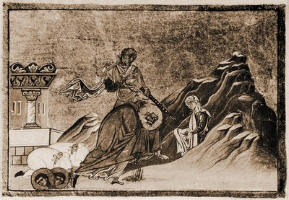
The Works Of Dionysius The Areopagite Volumes 1 & 2
SECTION XIX
Such a statement as this might be alleged by way of objection. We, however, on our part, will pray the objector to look to the truth of the facts, and will make bold to say this first. The Evil is not from the Good, and if it is from the Good, it is not the Evil. For, it is not the nature of fire to make cold, nor of good to bring into being things not good; and if all things that be are from the Good (for to produce and to preserve is natural to the Good, but to destroy and to dissolve, to the Evil), there is no existing thing from the Evil, nor will the Evil itself be, if it should be evil even to itself. And, if it be not so, the Evil is not altogether evil, but has some portion of the Good, in consequence of which it wholly is. Now, if the things existing desire the Beautiful and Good, and whatever they do, they do for the sake of that which seems good, and every purpose of things existing has the Good for its beginning and end (for nothing looking to the Evil quâ evil, does what it does), how shall the Evil be in things existing; or, wholly being, how has it been seduced from such a good yearning? Also if all the things existing are from the Good, and the Good is above all things existing, then there is existing in the Good even the non-existing; but the Evil is not existing; and, if this be not the case, it is not altogether evil, nor non-existing, for the absolutely non-existing will be nothing, unless it should be spoken of as in the Good superessentially. The Good, then, will be fixed far above both the absolutely existing and the non-existing; but the Evil is neither in things existing, nor in things non-existing, but, being further distant from the Good than the non-existing itself, it is alien and more unsubstantial. Where then is the Evil? some one may perchance say. For if the Evil is not,—virtue and vice are the same, both universally and particularly. Or, not even that which opposes itself to virtue will be evil, and yet sobriety and license, and righteousness and unrighteousness, are contraries. And I, by no means, speak in reference to the just and unjust man, and the temperate and intemperate man; but also, long before the difference between the just man and his opposite is made manifest externally, in the very soul itself the vices stand altogether apart from the virtues, and the passions rebel against the reason; and from this we must grant some evil contrary to the Good. For the Good is not contrary to Itself, but as the product from one Source and one Cause, It rejoices in fellowship and unity and friendship. Nor yet is the lesser good opposed to the greater, for neither is the less heat or cold opposed to the greater. The Evil then is in things existing, and is existing, and is opposed, and is in opposition to, the Good; and if it is the destruction of things existing, this does not expel the Evil from existence; but it will be, both itself existing, and generator of things existing. Does not frequently the destruction of one become birth of another? and the Evil will be contributing to the completion of the whole, and supplying through itself non-imperfection to the whole.
Copyright ©1999-2023 Wildfire Fellowship, Inc all rights reserved

 Keep Site Running
Keep Site Running